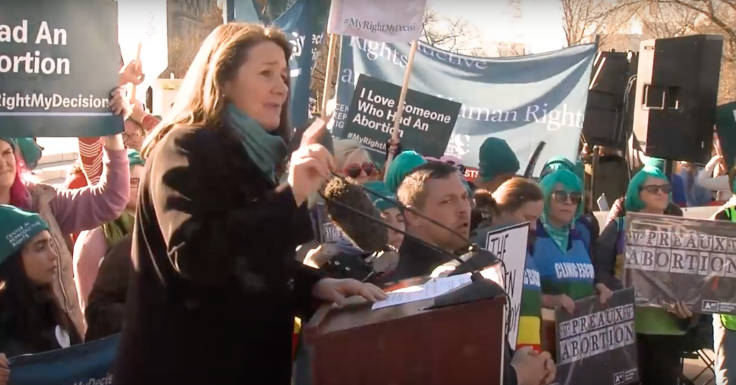
The U.S. Supreme Court heard oral arguments in June Medical Services v. Russo — the first abortion rights case to be heard under the current makeup of the Supreme Court. The case challenges a Louisiana law that would shut down every abortion clinic in the state except for one. The law (Act 620) bans doctors from providing abortion care unless they have to admit privileges at a hospital within 30 miles.
In a 2016 case also brought and won by the Center — Whole Woman's Health v. Hellerstedt — the Supreme Court struck down an identical law in Texas, finding that admitting privilege requirements pose an "undue burden" on the right to abortion and are medically unnecessary. In the courtroom, Center for Reproductive Rights' Senior Litigation Director Julie Rikelman argued to the Justices that Act 620 should meet the same fate, as nothing has changed since 2016 that would justify a different outcome. Rikelman also argued that the law would close an even greater percentage of clinics in Louisiana than in Texas and that the medical consensus opposing this kind of law has only grown stronger since 2016.
The Center also argued against Louisiana's claim that abortion providers and clinics lack legal standing to fight for their patients' rights in court. Rikelman argued that the state's attack on standing contradicts 40 years of precedent, and is designed to insulate unconstitutional abortion restrictions from being challenged in court. Nearly all abortion cases today are brought by doctors and clinics. If they did not have third-party standing, patients would have to initiate court proceedings themselves and file a case while still pregnant, at the same time they are urgently seeking abortion care.
"We are back at the Supreme Court today fighting a law identical to the one we defeated in 2016. We emphasized to the Justices today that nothing has changed in the last four years that would warrant a different ruling. In fact, the medical consensus has only grown stronger that admitting privileges are medically unnecessary and actually harm women by closing clinics and putting abortion out of reach. The Supreme Court declared Texas's law unconstitutional after it closed roughly half the clinics in that state. In Louisiana, the impact would be even more severe, closing all but one clinic. We are confident the Court will agree that a law is ruled unconstitutional four years ago cannot be constitutional today," said Julie Rikelman, Senior Director of US Litigation at the Center for Reproductive Rights.
Act 620 and the State's challenge to standing have been denounced by a coalition of leading voices in medicine, law, and public policy who joined with abortion patients and advocates to submit 27 amicus briefs to the Supreme Court in support of the Center's case.
While the Supreme Court heard arguments, thousands of supporters gathered outside the courthouse to rally against a growing tide of political attacks on women's reproductive rights. More than 40 speakers addressed the crowd including celebrities Elizabeth Banks and Busy Philipps; legislators such as Senator Charles Schumer (D-NY), Diana DeGette (D-CO), Barbara Lee (D-CA), Ayanna Pressley (D-MA), and Judy Chu (D-CA); abortion providers; faith leaders; and women who have had abortions and experienced first-hand the barriers created by anti-abortion laws.
"We should not have to refight legal battles that we've already won, but states like Louisiana are in open defiance of the Constitution and the Supreme Court's rulings," said Nancy Northup, president, and CEO of the Center for Reproductive Rights. "It's alarming and unacceptable that in 2020, some states are still hell-bent on denying women access to reproductive healthcare. Once again, the Court must step in to block these clinic shutdown laws and ensure that the promise of Roe v. Wade is realized for all women."
While Kathaleen Pittman, clinic administrator at Hope Medical Group (lead plaintiff) said that "Louisiana lawmakers have tried every which way to end abortion care in our state. This law is one of many attempts to shut us down and prevent our patients from accessing abortion services. I am optimistic that the Court will recognize Act 620 for what it is — an attempt to regulate abortion care out of existence. This law would be devastating for the women in our state and would no doubt have repercussions nationwide."
© 2025 Latin Times. All rights reserved. Do not reproduce without permission.






